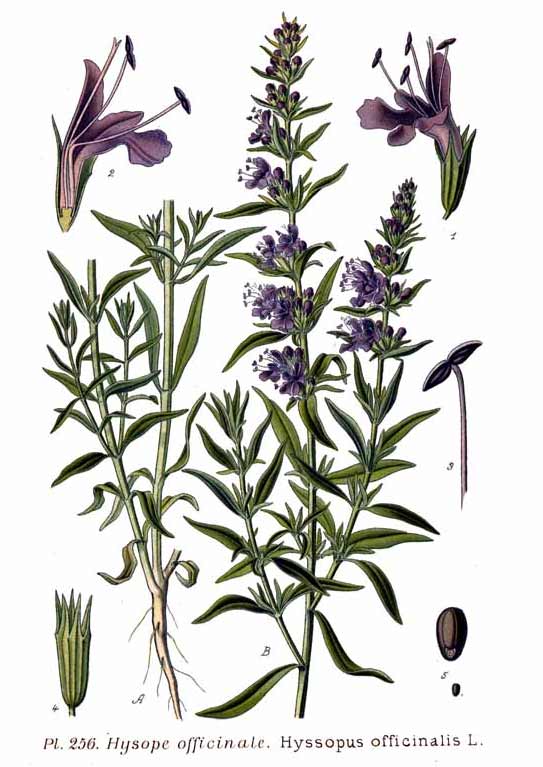Hyssop in herbal medicine and home remedies

There are two herbs commonly called hyssop, but they are not related.
Anise hyssop (Agastache) is not the same as hyssop (hyssopus). Anise hyssop is native to North America and a member of of the mint family, while hyssop spp is a member of the carrot family and native to Europe.
In this post I am writing about the European hyssop (hyssopus). Read about anise hyssop here.

Hyssop relaxes blood vessels and eases flu symptoms.
Hyssop leaves and flowers promote sweating and reduce phlegm. The herb is used to treat bronchitis, chills, asthma, herpes, and rheumatism.
Hyssop relaxes peripheral blood vessels which results in better circulation. Its anti-viral and anti-inflammatory properties make it an excellent choice for relieving flu and cold symptoms, especially when used in compresses and poultices.
Hyssop can also be combined with figs and used to treat constipation.
Combine hyssop tea with licorice, anise, or mullein when treating bronchitis and other lung conditions.
Hyssop essential oil relieves stress.
Hyssop essential oil is uplifting and increases alertness. It is also a gentle and relaxing nerve tonic suitable for treating anxiety and depression.
Use of hyssop essential oil eases feelings of grief, nervous exhaustion, and guilt.
An effective chest rub is made by combining 5 drops each of hyssop, thyme, and eucalyptus essential oils with a quarter cup of good carrier oil. Use liberally in the treatment of cough and asthma. This mixture may also be used in the bath.
Hyssop, herbs, and science
Hyssop is an effective treatment for colds, coughs, loss of appetite, fungal infections, and spasms.
Hyssop is full of terpenoids and flavonoids such as luteolin and quercetin, that have known antiviral and antifungal properties.
It also has antimicrobial and muscle relaxant properties.
Hyssop oil and extracts show strong antibacterial, anticancer, and antiviral properties.
Hyssop extracts were evaluated for their effects on breast cancer, malignant melanoma, and colon cancer. Results show that hyssop, with its high levels of antioxidants, is a useful treatment for these diseases.
Studies show that hyssop grown in different locations have different percentages of active compounds. Strength also depends on time of harvest, genetics, environment, collection time, and methods of preparation.
Of course, as an herbalist, I already knew this. It is true of all herbs!
The Bible calls for hyssop to purify and cleanse.
The Bible calls for the use of hyssop in many Old Testament purification and cleansing ceremonies. Psalm 51:7 says, “Cleanse me with hyssop, and I will be clean; wash me, and I will be whiter than snow.”
Exodus 12:22 gives directions for the Passover, “Take a bunch of hyssop, dip it into the blood in the basin and put some of the blood on the top and on both sides of the doorframe.”

Hyssop meatball recipe
Hyssop is also used as a culinary herb in savory and sweet dishes.
Here is a delicious meatball recipe:
- Eight ounces lean ground beef
- Eight ounces sausage
- One chopped onion
- Two cloves chopped garlic
- Two tablespoons chopped parsley
- Two tablespoons chopped hyssop
- One large egg
- One teaspoon ground black pepper
- 1/2 teaspoon salt
- Roll up mixture into medium sized balls, roll in sesame seeds, and fry until browned.
Hyssop is also good when made into thick syrup and served with fruit or custard.
Hyssop plants prefer full sun.
The plant prefers full sun and well drained soil slightly on the alkaline side. Wild hyssop is often found growing by roadsides and in dry, grassy meadows.
Propagate by seeds, stem cuttings, or root divisions. Once established, hyssop will thrive with little care for many years.
Harvest hyssop while flowering in late summer to dry for winter use.
*Hyssop essential oil is not for internal use. Do not use hyssop essential oil in high doses as convulsions may occur in sensitive individuals.
Always consult with a healthcare professional when using any herbal remedy especially when pregnant, nursing, or taking other medications.
Sources:
https://www.ncbi.nlm.nih.gov/pmc/articles/PMC8776447/
Blessings to you and yours!
Thanks so much for reading my blog. Jan.

*Note - the information on this website has not been evaluated by the Food and Drug Administration.
© 2005-2024 website design and content by Janice Boling